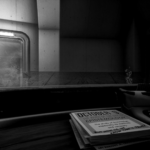
“Well, Constable,” Inspector Royston Luckinbill said, “what do you make of this?” They had the details from the latest murder attributed to Foggy Jack laid out on the table, ready to be integrated into their investigation boards.
“It don’t fit the M.O. at all,” Constable Burne-Jones told him, shaking his head at the photos and objects arrayed before him. “Foggy Jack’s murders are messy hack-and-slash affairs. This is much too clean to be him. There’s not even any blood. Not to mention the lack of toxic fog. Foggy Jack always leaves his victims in a patch of pea soup, don’t he?”
“Could perhaps the mustard gas be an improvised toxic cloud?” Luckinbill asked, purposely attempting to mislead him.
Burne-Jones shook his head again. “It’s a remote possibility, but not likely. Foggy Jack doesn’t actually use the fog to kill his victims. It’s more of a calling card than anything. The murders themselves are done with the cleaver. And that’s another thing. He never kills in the Garden District. There ain’t no attention in it.”
“Spot on,” Luckinbill praised. “We’ll make a detective of you yet. What else is wrong with this picture?”
Burne-Jones considered for a moment, then ventured, “This was premeditated. Foggy Jack is an opportunistic killer. He hunts. He doesn’t set traps. The gas masks were sabotaged in advance and the use of a mustard gas bomb… having brought his own lock and chain? This was something the killer prepared for. He sourced equipment for it.” He looked to Luckinbill for confirmation, but Luckinbill pressed on.
“But what of the note? It points us directly to Foggy Jack.”
“A red herring to make us think this is one of his murders,” Burne-Jones dismissed. “Foggy Jack always types his letters to the authorities. Least he’s done so far.” He gestured at the investigation boards with Foggy Jack’s typed missives pinned to them. “This one is handwritten.”
“We can’t rule out entirely that it’s from him, but that does make a strong case against,” Luckinbill said. “If this is a copycat killer, then what is his motive?”
“To kill off the apple tree?” Burne-Jones guessed. “That’s the most obvious thing, innit? Maybe a jealous wastrel, wanting to ruin them for everyone in the Village…” Luckinibill opened his mouth to redirect Burne-Jones’ thinking, but Burne-Jones realized the flaw in this theory himself first. “No, not the apples,” he said, shaking his head and pointing at the photo of the tree. “If the killer wanted to kill the apple tree, he didn’t need four constables locked in with it. It had to be kill the constables.”
“But why?”
Burne-Jones thought it over. “We can’t say for sure yet. We’ll need to do interviews to see if there’s any stronger link between them than them just being assigned to the same post. There could be a smaller conspiracy involving them all, but at this point, we’ll have to assume that the motive was to kill any constables, and these four just happened to be in an easy spot to do it.”
Luckinbill nodded approvingly. “What do their sabotaged gas masks tell us?”
Burne-Jones grimaced. “I… hesitate to speculate, sir,” he said, knowing full well that wasn’t an acceptable answer. He didn’t want to acknowledge what the evidence was telling him. This was his last feeble gambit to put off having to give voice to it.
“I understand,” Luckinbill commiserated. “However, it is our duty to consider all possibilities, especially in the face of the unthinkable. So I must insist that you do.”
Burne-Jones took a deep breath and stated his theory.
“They checked all the gas masks once everyone came back in from their shifts. Only the victims’ were damaged; everyone else’s were right as rain. Whoever sabotaged them had to have access to them before the constables reported for their shift at the apple tree and they had to know which constables were assigned there.” Burne-Jones looked to Luckinbill and for once hoped that his deduction was wrong. “It points to this killer being one of our own.”
“Unfortunately, yes,” Luckinbill agreed. “Knowing that, who could have had the necessary access and knowledge?”
“Nearly everyone at HQ. Our assignments are posted on the assignment board. Anyone who wanted to know could see who was posted where. We don’t have locks on our lockers because we’re all constables. We should all be trustworthy, shouldn’t we? But anyone who knew the victims were posted to the apple tree could have opened their lockers and poked holes in their mask filters earlier in the day.”
“We need to narrow the suspect list,” Luckinbill said. “How do we do that?”
Burne-Jones leaned over the table and examined the evidence again. If they couldn’t shorten the list of suspects based on access to the gas masks or knowledge of assignments, maybe there was something else. Anyone could buy a chain and a lock from Lionel Castershire or scavenge one from an abandoned store in the Garden District. Mustard gas bombs were a war relic that still cropped up both in the Village and in the Garden District from time to time. Again, it was possible anyone could- that was it!
“Our suspect must be someone who can move freely between Maidenholm and Lud’s Holm. The Megiddo Bridge doesn’t have a checkpoint for those leaving the Village, but there is a Doctor on duty who checks those returning for plague. He might be able to tell us if any constables aside from the victims crossed back into Maidenholm that night or the morning after.”
“Very good, Constable!”
Burne-Jones wasn’t as pleased with his conclusion.
“What are we to do about this in the meantime?” he asked. “If we say this a copycat, he’ll know we’re on to him and might cover his tracks better. And that’s assumin’ they even believe us.” He himself had been loath to entertain the possibility that someone among their ranks had committed this crime; asking the entire constabulary to do so – especially when there was a note as good as saying it was Foggy Jack right there – was a good way to get laughed out of HQ. “But if we don’t, we’ll be leaving the rest of the constabulary blind to the danger they’re in.”
Luckinbill was the chief investigator on this case and so it fell to him to decide how to proceed. Burne-Jones watched him mull his options and it was clear he didn’t like any of them.
“If we tell them this is a copycat, we risk damaging the credibility of our entire investigation,” Luckinbill said finally. “So we’ll continue as is, quietly, so as not to scare the public, including our colleagues. We’ll have to keep what we know to ourselves for now and make our inquiries for this killer alongside those for Foggy Jack. We hide one investigation inside the other.”
Burne-Jones, resigned, nodded his agreement to this course of action. He didn’t like it either; it left the entire constabulary vulnerable to attack. If they let on about it, though, it compromised their chances of catching either killer.








Comment